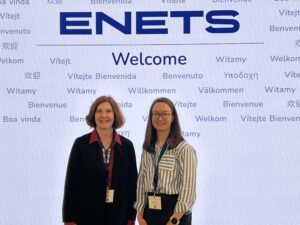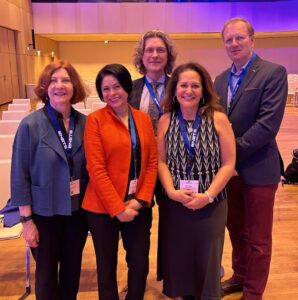Four NETRF-funded researchers were recognized for excellence and received awards at the recent European Neuroendocrine Tumor Society (ENETS) annual meeting in Vienna, Austria. CEO Elyse Gellerman and Director of Research Anna Greene (pictured below) attended the conference, which featured twelve NETRF researchers presenting their cutting-edge basic and translational work.

ENETS’ Annual Conference is a three-day event attended by the top NET experts in basic, translational, and clinical science. More than 900 people participated, with more than 300 abstracts submitted. ENETS is a great opportunity for researchers, NET specialists, and patient advocates to share their work and collaborate.
Dr. Talya Dayton received the award for the best NET basic science paper of the year. Dr. Dayton, group leader at EMBL in Barcelona, is a NETRF-funded investigator. Her paper, “Druggable growth dependencies and tumor evolution analysis in patient-derived organoids of NENs from multiple body sites” describes her work to create NET organoids, three-dimensional neuroendocrine tumor models, and understand their biology. Dr. Dayton’s work on lung organoids revealed a subset is dependent on a growth factor called EGF, which is a potential target for treatment.
Two NETRF-funded researchers received awards for best oral abstract presentations. Dr. Iacovos Michael, of Sunnybrook Research Institute in Canada, received the first-place basic science award for his “Establishment of novel patient-derived preclinical models for neuroendocrine tumors” using duck eggs as a medium. Dr. Netta Mäkinen, of Dana-Farber Cancer Institute in Boston, received the third-place award for “Characterizing the tumor microenvironment of multifocal small intestinal NETs.”
Dr. Yotam Drier, of Hebrew University of Jerusalem in Israel, received the award for best oral poster presentation. His 2019 NETRF Investigator Award led to the discovery of molecular subtypes of typical and atypical lung NETs. His poster was entitled “Enhancer heterogeneity of lung carcinoids reveals sensitivity to FGF signaling inhibition.”
During the three days, sessions were devoted to the biological origins of neuroendocrine neoplasms, (NENs), immunotherapy, radionuclide therapy (PRRT), and drug development. Scientists spoke about what we know and don’t know about how neuroendocrine cancers start and progress. They also discussed new potential targets for treatment, new immunotherapy approaches, and improved PRRT, including trials that are currently in progress. NETRF has played a large role in funding many of these studies, and we look forward to seeing how they advance the field.
NETRF congratulates these researchers for their dedication to the field and their great progress in advancing work to identify and develop new treatments for neuroendocrine cancer.

L-R: NETRF CEO Elyse Gellerman, Dr. Jaydira Del Rivero from the National Cancer Institute, Executive Director of HealingNET Mia Tepper, and in back is Mayo Clinic’s Dr. Thor Halfdanarson and Professor Wouter de Herder from Erasmus MC, Netherlands.
